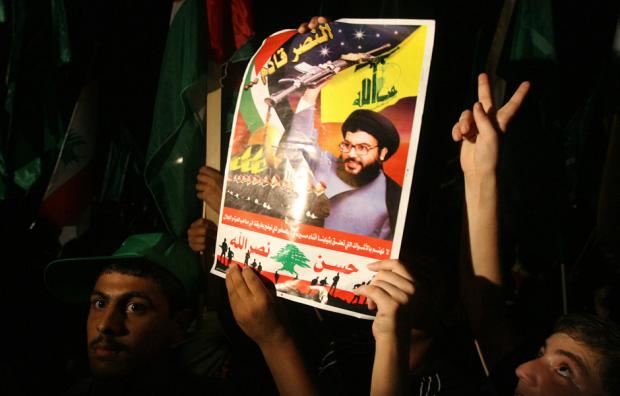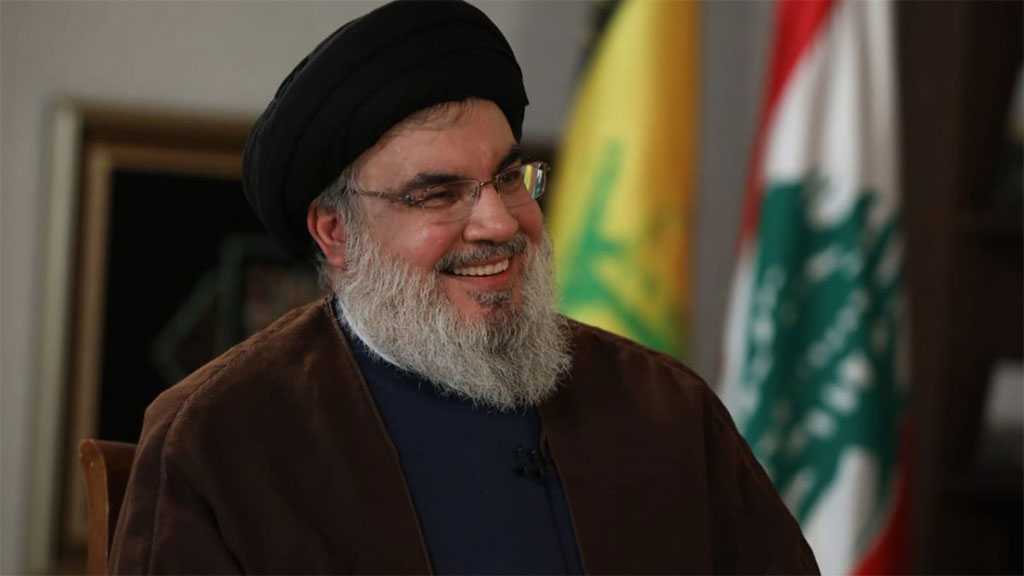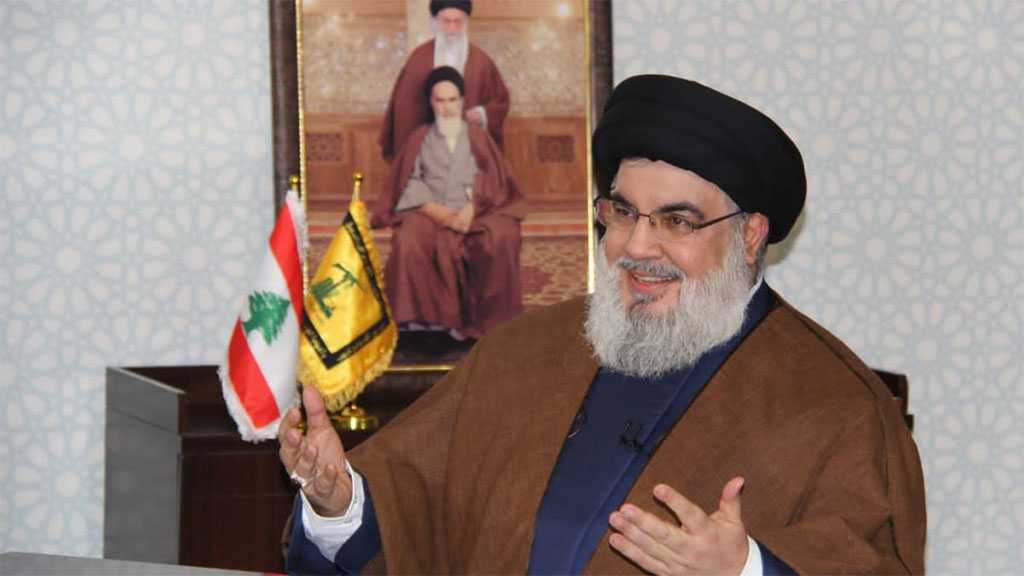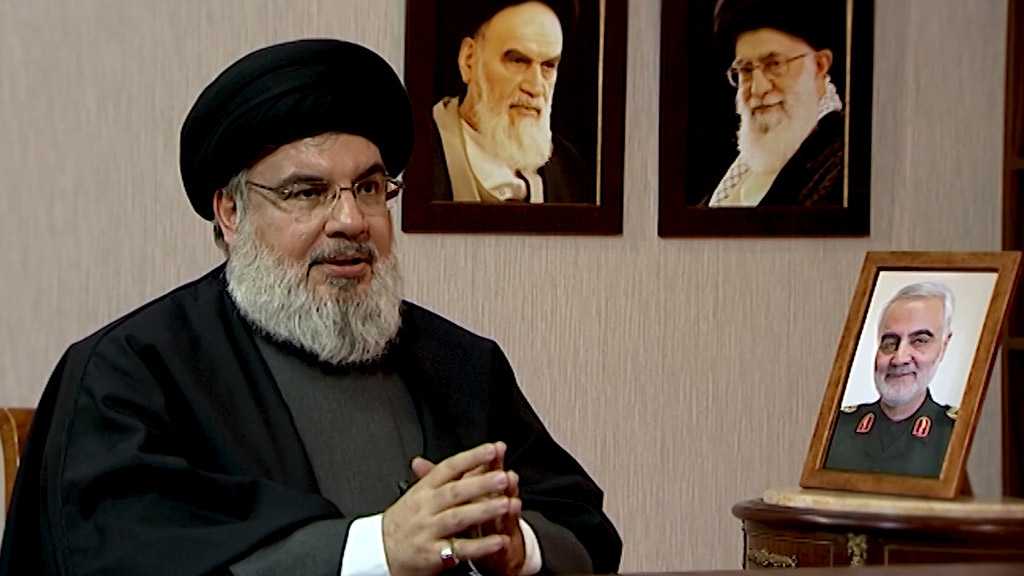
Sayyed Hassan Nasrallah: The Resistance in Gaza is on quest for tangible victory

In an exclusive six-hour-long interview with Ibrahim al-Amin, Wafic Qanso, Hassan Ileik, and Maha Zureikat from Al-Akhbar, Hezbollah Secretary General Sayyed Hassan Nasrallah took the time to discuss issues ranging from Syria, the recent Gaza war, the 2006 war with Israel, domestic Lebanese issues, and his own personal habits.
Al-Akhbar is publishing the interview as a multi-part series over the next two days. In this particular section, the interview focused on the recent Israeli war on Gaza.

To what extent did the war on Gaza in 2014 surprise you, especially since Hezbollah was cautious in the early days [of the war], in terms of its position and media performance. Was there fear that the Resistance was being lured into a trap?
It is obvious that the Resistance is not looking for a symbolic victory to lift morale or for a face-saving way out, rather it is looking for a real achievement, namely, lifting the siege, even if it is costly.Were the Palestinian developments expected? No, but they were not surprising either.
Things surprise you if they happen out of context. Clearly the Israelis, not the Resistance, pushed matters in this direction since the kidnapping of the three settlers. The behavior of the Israelis was not the behavior of someone searching for kidnapped people. Under the pretext of looking for the three kidnapped settlers, they did all they could in the West Bank to wipe out Hamas, the Islamic Jihad, the Popular Front and everything that has to do with the structure of the Resistance.
Things escalated and I am closer to the view that developments took a life of their own, and the Israelis went along and the Resistance went along, in the sense that neither of them planned for the war. Some, unfortunately, accused the Resistance of going to war to revive its political role or to resuscitate the Turkish-Qatari-Muslim Brotherhood axis. I don't see it that way.
The Israelis, who are observing the developments and transformations in the region, are not in a rush to go to war. But when events started happening, an opportunity and a threat presented themselves. The Israelis wanted to take advantage of the opportunity and the Resistance confronted this threat and tried to turn it into an opportunity. That is how we understand what happened. The Israeli side thought, since we went to war anyway, we might as well take advantage of this opportunity.
Especially as Gaza is under siege, the Arab world is torn apart, the focus on regional and international affairs is elsewhere and the concerns of the Arab people are also elsewhere. In the early days of the war, Israel hit all the targets they knew of. However, rockets continued to be launched from Gaza. That is why Israel found itself facing a big problem. As for the Resistance, it was determined to use this war that was imposed on it as an opportunity to lift the siege. It is obvious that the Resistance is not looking for a symbolic victory to lift morale or for a face-saving way out, rather it is looking for a real achievement, namely, lifting the siege, even if it is costly.
This is a point of strength for the Resistance, first, because it is the wish of all the Resistance factions in Gaza and secondly, because there is a real popular will on the issue of lifting the siege. Perhaps people disagree with Hamas on issues like running the Gaza Strip, power and government, and the factions may disagree in their positions regarding regional events but the question of lifting the siege is a unanimous, popular demand for all Gazans.
This is our understanding of the nature of the battle. That is why when a cease-fire and a truce were suggested at the beginning, there was a consensus among the Resistance factions not to accept the offer without lifting the siege. From the beginning of the war, that was the goal of the Resistance. The Israelis, in my opinion, were stuck and they tried really hard to learn from the mistakes of the July War (2006 war on Lebanon.) From the beginning of the war on Gaza, Lebanon's July War was present in the Israeli media.
Do you agree that the goals of the enemy were modest?
That is one of the lessons of the July War. The Israelis tried to learn from the lessons of the July War, but instead, they got stuck. That is why they did not specify a goal. I followed the war from the beginning, it is not clear to me what the goal was.
There is no final official word on that. One speaks about toppling the Hamas regime, another speaks about disarming the Resistance or stopping the rockets or stopping the smuggling or manufacturing of rockets or destroying the tunnels. Even the question of the two prisoners, they are ignoring it as much as possible because they know they can not get them back without negotiations and without a price. They will not get to them through political or military pressure. The Israelis are in a predicament. Perhaps they thought the Resistance does not have the will to persevere and the people will not be able to withstand this level of sacrifice.
I believe the enemy thought, as Shimon Peres did in the 1996 Grapes of Wrath operation, the Resistance's stockpile of rockets will run out. Then they will say that they stopped the rockets without giving anything to the Palestinians. But their calculations did not pan out.
Did you receive a request from the Palestinians for direct intervention?
Brother Mousa (Abu Marzouk) talked about it. But no one from the other factions talked to us and I think they understand.
Does [Abu Marzouk's] request reflect Hamas' real position?
Had this request been serious, it would have been discussed within closed circles, not in the media. The lines of communication between us and Hamas were never severed, even during the period when it was said that our relationship regressed. The lines of communication exist and there are always contacts. He or one of Hamas' leaders could have asked us to discuss the issue. But to bring it up in the media, in my opinion, raises questions and I did not find it appropriate. I don't want to analyze, what matters are good intentions and understanding.
Perhaps he believed the situation was difficult so he brought up the idea, but an issue of this importance and gravity should not be discussed through the media. That is why we did not follow up on the request in the media, because this issue - whether there is an interest to interfere directly or not - ought to be discussed between us.
Have you talked to Hamas about this issue?
No.
You did not discuss the matter?
The Israelis are in a predicament. Perhaps they thought the Resistance does not have the will to persevere and the people will not be able to withstand this level of sacrifice.We are always in contact but we did not talk about this issue and neither did they.
In your opinion, how long did the Gaza war delay the next Israeli war on Lebanon?
I can say that it delayed it but I can't say for how long. Because it is unclear under which circumstances and conditions the Israelis would wage a war if they wanted to. After the July War and the lessons they learned, the Israelis assume that any future war must lead to a quick, decisive and clear victory.
In the July War, everyone said Israel was defeated but some might claim otherwise. This happened recently when some said they discovered that they won because the South Lebanon front was not opened, even though this front was not opened during the intifada after 2000, or during Operation Defensive Shield in 2008 or the eight-day war in 2012.
Since the July War, Israel insists that victory in any war in Lebanon must, first of all, be quick. It cannot take a long time and cannot turn into a war of attrition and bombing of cities.
Second, a victory should be decisive, not limited or temporary and the war should achieve all the goals, not modest goals. Third, it has to be clear and unambiguous. The reason for this is their realization that any future war is going to be a lot more difficult in terms of its targets and the ability of the Resistance - its rocket capabilities and capabilities in all areas. The enemy cannot withstand a war of attrition.
We see Israel today under pressure even though the number of rockets launched from Gaza on Tel Aviv and other areas is quite limited. They speak of the effectiveness of the Iron Dome but that is debatable because the Iron Dome might be able to intercept a limited number of rockets but it will face a real issue when there is a large number of rockets.
Israel worked hard to learn the lessons of the July War in terms of its training and equipment and tried to implement what it learned in Gaza. It assumed that it addressed all the gaps, not to mention that it has massive intelligence on Gaza. Nevertheless, they failed and they are the ones saying this, not us. So when they fail in their confrontation with Gaza, which is besieged and its capabilities are known, then surely they must seriously reconsider their calculations. I believe things are different after the Gaza war than they were before it.
What is your advice to the Palestinian Resistance and people in Gaza?
These are their convictions, their will and their culture. When a human being is given two choices, either surrender or fight, there is no choice between fighting and humiliation. The culture of the Resistance and the choice of the Resistance grew among the Palestinian people because they have no other option.
They tried [with] the negotiations and they waited long enough for the regional and international situations to change. In relation to Egypt, a golden opportunity presented itself for Gaza and the whole Palestinian cause but it was soon lost. For the people living in Gaza, what choices do they have? Either resist or surrender to Israeli conditions or throw themselves in the sea or immigrate and join the refugee camps. I think after all these experiences, the Palestinians have no choice but the one they have chosen today.
There is no choice here, in the sense that if a human being cares about his dignity, survival and existence, he resorts to this choice. There are people who surrender. The people of Gaza made up their minds not to surrender and to withstand the consequences of this decision, even if it was costly. They have confidence in the Resistance and that the path of the Resistance might yield results. Reason and logic - not slogans - say that they should fight.
Clearly there is a problem between the Resistance axis and the Egyptian leadership. The issue is not just about Hamas. How do you deal with the position of the Sisi government regarding the assault on Gaza and the pressure on the Resistance?
I want to borrow the words of one of the leaders of the Palestinian Resistance that Gaza's problem is that it is caught between a problem of confidence with Israel on one hand - a fundamental and substantial problem - and between two axes on the other, the Qatari-Turkish axis and the Egyptian-Saudi-Emirati axis. The reasons for this division are understandable and well-known, but unfortunately it is a sharp and jarring division at a time when this division should be overcome one way or another.
We, for example, after consultations with the brothers in the Palestinian factions and the brothers in Iran, suggested to the Iranians to get in touch with the Turks, Qataris, Egyptians and Saudis even if it is through the United Arab Emirates or Oman. As far as the Resistance axis is concerned, we are not concerned with scoring points or using the Resistance movement in internal and regional considerations.
There is a fundamental goal, and that is stopping the war on Gaza and lifting the siege. When there are clashes, the priority is for people to talk to each other. But in the midst of the events, the Egyptian position, for example, was difficult as Turkish Prime Minister Recep Tayyip Erdogan attacked Egyptian President Abdel Fattah al-Sisi personally. Even the Qatari position towards Egypt, through Al-Jazeera, was negative. If you want to help Gaza, then you should talk to Egypt. The Palestinians themselves say that any solution or compromise is not possible without Egypt. This requires the two competing axes to give priority to Gaza over all the other discussions and conflicts, which has still not happened in an appropriate manner.
How do you see your relationship with Hamas in the future, not just as a political party, but also in terms of Iran and Syria, especially after the Gaza war?
They speak of the effectiveness of the Iron Dome but that is debatable because the Iron Dome might be able to intercept a limited number of rockets but it will face a real issue when there is a large number of rockets.Even before the Gaza war, we disagreed on Syria but contacts and meetings were never put on hold. Everything stayed normal.
And the support?
Obviously, our entire situation was affected by the events in Syria, Iraq and the region. On the Syrian issue, in all the meetings we had, the concern was always to understand their position and for them to understand our position even if we disagreed on assessing what is happening. We had many discussions around this issue. Of course the Gaza situation redirects the path to its priorities so we can communicate and cooperate more. That will push the relationship between Hezbollah and Hamas and between Hamas and the Islamic Republic [Iran]. The Syrian question is different, complicated and requires more time. It is subject to regional developments and has no prospects in the foreseeable future.
Are we going to enter Jerusalem?
I have no doubt.
The public today wonders what we have to do with Palestine and why should we liberate Jerusalem?
The most dangerous problem we face today, whether it is with the Lebanese or Arab public, is to get to a point where the people of the region consider Israel's existence normal. That it does not constitute a threat to the region and the people of the region and that, if it is a problem, it is so for the Palestinian people only and not for the rest of the people in the region. This has to do with politics, security and economics. First of all, Israel is an illegitimate entity and it is a threat to the region. It is a constant threat to the whole region.
We cannot coexist with this threat, that is why the ultimate goal of the [Arab and Islamic] nation is to end Israel's existence irrespective of the problems, sensitivities and everything that has happened and could happen between Palestinians and non-Palestinians, Shia and Sunni, Muslims and Christians. All the strife, sensitivities, disputes and struggles should not eradicate the culture that says Israel is a cancer, an absolute evil and a danger to the peoples and governments of this region and to their dignity and holy sites. Therefore, the ultimate goal should be to remove it.
[The Israelis] want to get us to the point [where we fight each other and forget about Israel]. There are times when they succeed but we should never get there. This is if we are talking politics, economics, security, military, environment and so on. If we are talking from an ideological standpoint, then this issue should not be subject to debate. When it comes to ideological issues, the popular space that is affected by moods and emotions contracts is narrower. People confirm that they have an ideological position on Israel and it does not change if we are on good terms with the Palestinians or not.
Therefore, Hezbollah's relationship to the conflict with Israel, even in terms of the realities on the ground inside Palestine, is not up for debate.
Source: Al-Akhbar English
Comments


![Gen. Soleimani: Sayyed Nasrallah’s Entire Existence Is Sincerity… I Love Him [Documentary]](https://english.alahednews.com.lb/uploaded2/images/20220908122823.jpg)
